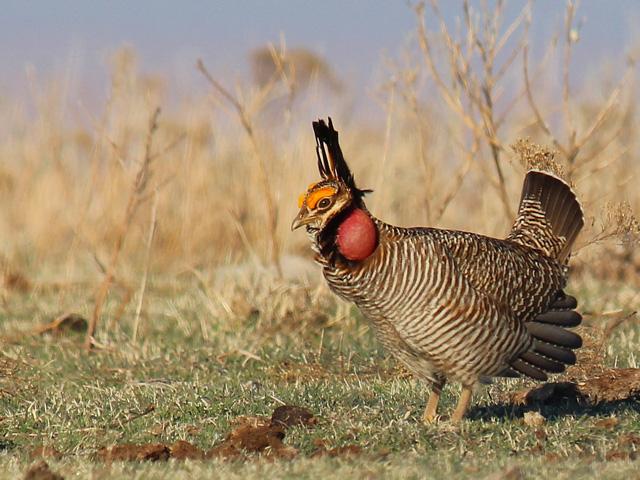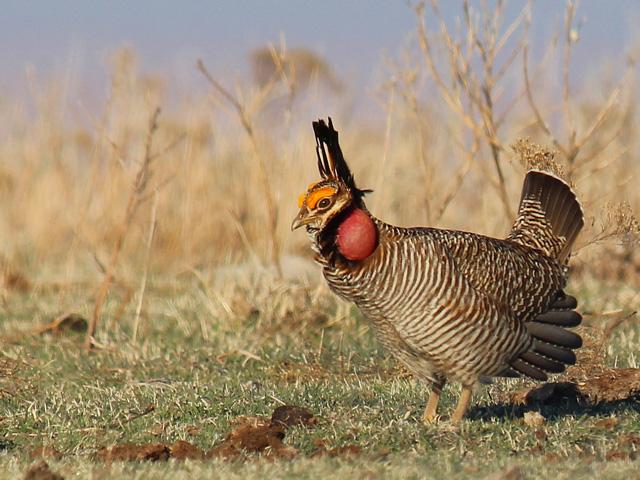Ag Policy Blog
Kansas Senator Praises Vote to Overturn Lesser Prairie Chicken Listing
Kansas Sen. Roger Marshall on Thursday praised the U.S. Senate vote Wednesday evening to overturn Endangered Species Act protections for the lesser prairie chicken.
The U.S. Senate voted 50-48 to support a resolution overturning the U.S. Fish and Wildlife Service (FWS) rule that lists the lesser prairie chicken as a "threatened" species in parts of Kansas, Colorado and Oklahoma while also designating the bird as "endangered" in parts of western Texas and New Mexico.
Sen. Joe Manchin, D-W.Va., was the lone swing vote, siding with Republicans to back the measure.
The National Cattlemen's Beef Association also welcomed the ruling. NCBA and its affiliate members from Kansas, New Mexico, Oklahoma and Texas are part of a lawsuit filed in the U.S. District Court for the Western District of Texas against the FWS over the listing, along with the Permian Basin Petroleum Association, which is the lead plaintiff in the case. The Texas federal court in 2015 overturned the last attempt by FWS to list the lesser prairie chicken.
"The lesser prairie chicken listing will do little to benefit the bird, but it will succeed in shutting down the voluntary conservation work that is responsible for the species surviving today. NCBA thanks Senator Marshall for his leadership on this issue, and we appreciate the support of those in the Senate who are listening to the concerns of farmers, ranchers and local officials," said NCBA Policy Division Chair Gene Copenhaver. "This resolution puts flexible, locally led conservation efforts back at the forefront. The Biden administration's actions to list the bird, micromanage grazing operations on private lands, and implement a top-down approach will not benefit the bird or the land."
State officials from Kansas, Texas and Oklahoma also each have filed lawsuits.
P[L1] D[0x0] M[300x250] OOP[F] ADUNIT[] T[]
In a press call Thursday, Marshall, a Republican, said the listing by FWS reflects that the Biden administration is attacking oil-and-gas production, as well as farming and ranching in rural America and the ability to transmit renewable energy power from wind as well.
"It does more than just impact the oil-and-gas industry. It impacts farmers and ranchers in the sense they're not going to be able to go out and check their cattle at certain times of the day, that they may not be able to plant wheat at a certain time of the day, that it impacts people building power lines from western Kansas where are the wind turbines are green energy, as they say," Marshall said.
Marshall added that listings such as the lesser prairie chicken drive up energy costs as well. "We feel like this president ignores rural America, that this is an attack on rural America and we hope that he doesn't veto it," the senator said.
Asked about the point of having the Endangered Species Act if it is overturned every time an industry is inconvenienced by a listing, Marshall said lesser prairie chicken numbers were on the rise. He also added that only about 2% of species listed under the ESA have ever made it off the list.
"There are so many more measures of the environment," Marshall said. "What's really happening on the ground? Throughout Kansas I've seen incredible environmental practices that we're growing more with less, that the soil is healthier, that the water is healthier to drink, the air is cleaner today than it was a decade ago, let alone several decades ago. So I think this is a piece of the puzzle."
Marshall added that environmental rules "need to be working with the farmers and ranchers, not working against us. The environmental (Endangered) Species Act has its place, but it just has oo much power right now. It's over utilized."
Rep. Tracey Mann, R-Kansas, also has a companion bill in the House that has moved out of committee and also likely will be brought to a floor vote.
The White House issued a policy statement that President Joe Biden would veto the bill if it makes it to his desk. The White House noted that the habitat for the lesser prairie chicken has declined by roughly 90% and the "populations have plummeted toward disappearance." The White House stated FWS made its review based on the best scientific evidence and added, "The rule also affirms and protects locally led and crafted voluntary conservation agreements that landowners and land managers have developed in recent years, which provide certainty for industry as well as safeguards for prairie-chicken populations."
For more details on the lesser prairie chicken listing, see "ESA Saga of the Lesser Prairie Chicken," https://www.dtnpf.com/…
Chris Clayton can be reached at Chris.Clayton@dtn.com
Follow him on Twitter @ChrisClaytonDTN
(c) Copyright 2023 DTN, LLC. All rights reserved.






Comments
To comment, please Log In or Join our Community .